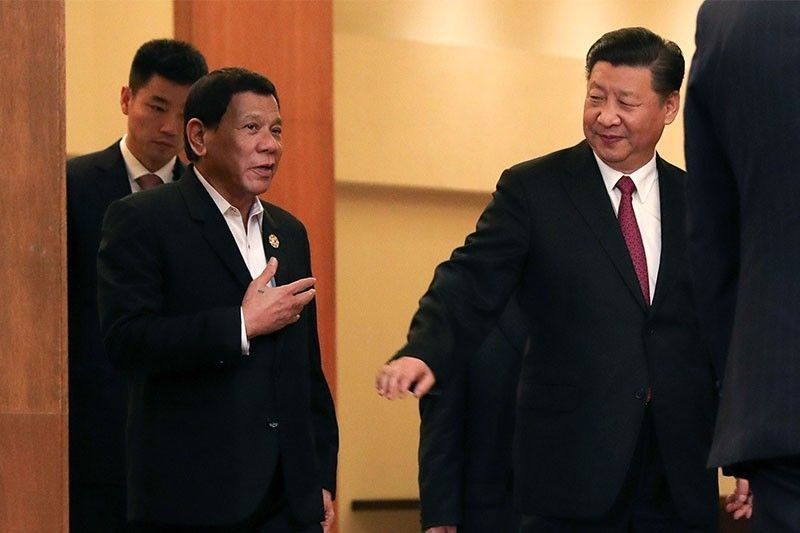Roque: Xi, Duterte agreed to keep West Philippines Sea status quo

MANILA, Philippines — The Philippines under former president Rodrigo Duterte had a “gentleman’s agreement” with China to keep the status quo in the West Philippine Sea, a former Cabinet official said yesterday, as fresh tensions surround the WPS due to recent incursions by Beijing that targeted a Filipino resupply mission and a research team.
Harry Roque, who served as presidential spokesman during the Duterte administration, said the deal covered the entire disputed area for both the Philippines and China.
He clarified that the agreement did not cover the removal of the BRP Sierra Madre, the rusty ship grounded at Ayungin Shoal since 1999 that serves as a Philippine Navy outpost.
“Yes to status quo. No to removal of (BRP Sierra Madre in) Ayungin,” Roque said in a text message, when asked to confirm reports quoting him as saying that Duterte had a gentleman’s agreement with China on keeping the status quo in the West Philippine Sea.
“No specific agreement on Ayungin,” he added.
In 2017, then defense secretary Delfin Lorenzana told members of the House of Representatives that a “modus vivendi” – an arrangement between two parties with different views – on the West Philippine Sea row was brokered by former foreign affairs secretary Alan Cayetano.
He explained that under the deal, China would neither occupy new features in the South China Sea nor build structures in Panatag (Scarborough) Shoal, a traditional fishing ground off Zambales.
In the same year, Cayetano said Duterte was trying to ease tensions over the maritime row through the status quo.
Roque said the previous administration’s agreement with China was not in writing and cannot bind President Marcos.
“This (administration) must come up with its own agreement if it thinks that Duterte’s policy was not effective,” the former presidential spokesman said.
“Personally, Duterte enabled friendly relations and enabled us to advance the Philippines’ interest in terms of investment and trade. (It) certainly minimized water cannon incidents,” he added.
In an interview with news website Politko, Roque said what was agreed upon was there would be no further improvements and that only water and food would be sent to troops stationed at the BRP Sierra Madre.
Status quo
In an interview with One News’ “Storycon,” Roque explained that the gentleman’s agreement covered improvements on geographic features, not the towing away of the BRP Sierra Madre.
“The status quo is that Sierra Madre is already in Ayungin because it was stuck there by the administration of (former president Joseph) Estrada,” he said.
“What we mean by status quo is Sierra Madre is there and that the Chinese and the Philippine side will not make any improvements on any of the geographic features found in the disputed areas of the West Philippine Sea.”
Roque said Duterte had summoned the Chinese ambassador after a water cannon incident involving a resupply ship also in Ayungin.
According to him, the former president did not even mention anything about the removal of the grounded ship from the shoal.
“But there was no mention at all in that meeting that the Philippines ever committed to tow away Sierra Madre. I recall being present in that meeting, and there was no agreement. There was absolutely nothing mentioned by president Duterte that the Sierra Madre would be towed away.”
Philippines drawing in US
Asked for his view on Marcos’ handling of the dispute, Roque replied: “I think the policy of the PBBM administration is really to increase tension between the Philippines and China so the Philippines can invoke the Mutual Defense Treaty and could get the United States involved in the current standoff.”
Roque believes it was wrong for the Marcos administration to assume that under the current situation, the US would be militarily involved pursuant to the Mutual Defense Treaty.
Roque, who was in China recently, said the view from Beijing is that the Philippines has become “belligerent.”
“It (Philippines) is really provoking China into an open confrontation. And that is now very evident in the writeup about the Philippines. I saw in two English language newspapers in China and that was basically the tenor of the news reports: that the Philippines is now provoking China into war,” he said.
“Precisely the provocation is because they know about the Mutual Defense Treaty. So they are anticipating that while the Philippines cannot possibly engage China in a shooting war, the Philippines believes that the US can engage China in a shooting war.” – Michael Punongbayan, Marc Jayson Cayabyab, Cecille Suerte Felipe
- Latest
- Trending



























